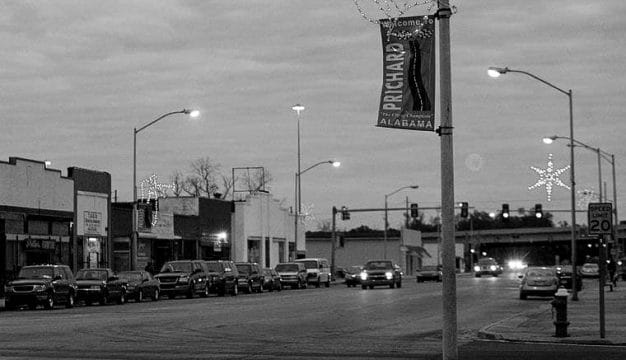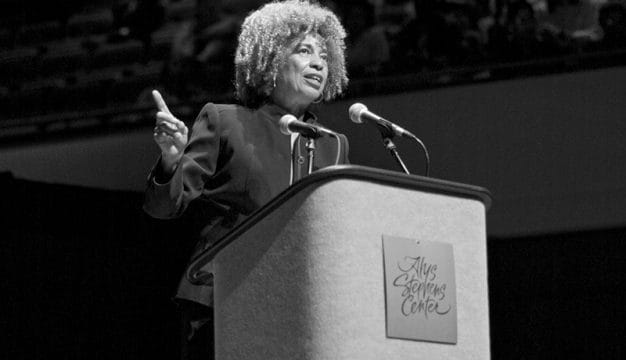The Little Foxes
The Little Foxes, a play written by New Orleans native Lillian Hellman (1905-1984), is based upon the lives of Hellman’s family in Demopolis, Marengo County. The play premiered on February 15, 1939, in Broadway’s National Theatre and became an enduring stage hit and a successful Hollywood film.
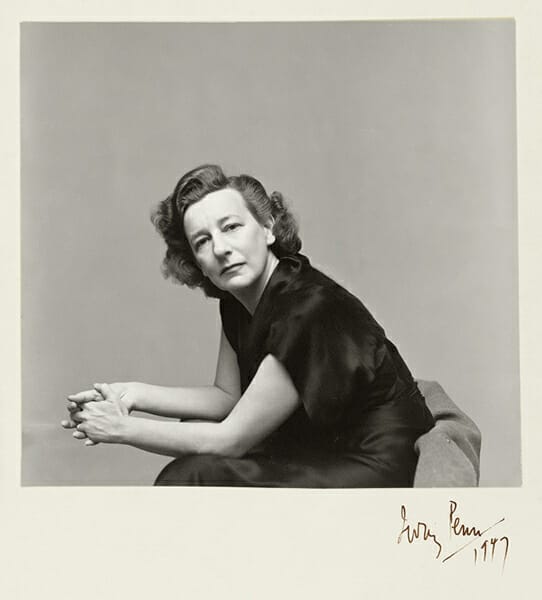 Lillian Hellman
Hellman’s great-grandfather Isaac Marx, the first Jewish settler of Demopolis, emigrated from Bavaria to west Alabama in 1844. Marx began his American life as a peddler on horseback. His commercial success enabled him to build a large brick store in the heart of the town. After the Civil War, Marx returned from his duties in the Confederate Army to build even more Demopolis businesses, including a downtown bank operated by two of his sons. His daughter, Sophie, also had a taste for business and married another affluent native of Demopolis, Leonard Newhouse, on May 24, 1876. She identified herself as a “capitalist” in the U.S. census of 1900. Sophie’s daughter Julia Newhouse, Lillian Hellman’s mother, proved to be much less driven and competitive than the other members of her Demopolis family. Many members of the Marx and Newhouse families are buried in the Jewish portion of Mobile‘s historic Magnolia Cemetery.
Lillian Hellman
Hellman’s great-grandfather Isaac Marx, the first Jewish settler of Demopolis, emigrated from Bavaria to west Alabama in 1844. Marx began his American life as a peddler on horseback. His commercial success enabled him to build a large brick store in the heart of the town. After the Civil War, Marx returned from his duties in the Confederate Army to build even more Demopolis businesses, including a downtown bank operated by two of his sons. His daughter, Sophie, also had a taste for business and married another affluent native of Demopolis, Leonard Newhouse, on May 24, 1876. She identified herself as a “capitalist” in the U.S. census of 1900. Sophie’s daughter Julia Newhouse, Lillian Hellman’s mother, proved to be much less driven and competitive than the other members of her Demopolis family. Many members of the Marx and Newhouse families are buried in the Jewish portion of Mobile‘s historic Magnolia Cemetery.
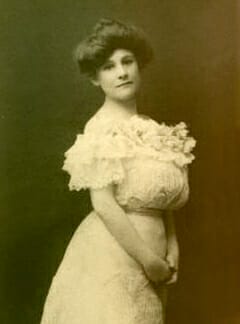 Julia Newhouse
Thanks largely to the success of The Little Foxes, Hellman remains arguably America’s most influential woman playwright. She did not retreat from controversy and was extremely independent for a woman of her time. Many years before America’s involvement in World War II, the emerging Broadway playwright of the 1930s voiced opposition to the aggressions in Europe by Hitler’s Germany. In her autobiographical books, notably the prize-winning An Unfinished Woman and Pentimento, Hellman suggests that her activism grew from her outrage as a young woman over the greed and materialism openly endorsed by her mother’s banking family.
Julia Newhouse
Thanks largely to the success of The Little Foxes, Hellman remains arguably America’s most influential woman playwright. She did not retreat from controversy and was extremely independent for a woman of her time. Many years before America’s involvement in World War II, the emerging Broadway playwright of the 1930s voiced opposition to the aggressions in Europe by Hitler’s Germany. In her autobiographical books, notably the prize-winning An Unfinished Woman and Pentimento, Hellman suggests that her activism grew from her outrage as a young woman over the greed and materialism openly endorsed by her mother’s banking family.
Set in 1900, the original Broadway version of The Little Foxes starred Alabama actress Tallulah Bankhead in the lead role as the scheming Regina Hubbard Giddens, who attempts to engage her family in Alabama’s cotton industry using powers of persuasion that include blackmail. Director William Wyler’s 1941 film version of The Little Foxes, featuring Bette Davis as Regina, set a record for the most Oscar nominations (9) awarded any Alabama-based film until Forrest Gump, which won the Academy Award for Best Picture in 1994.
 The Little Foxes
In the 1999 Public Broadcasting Service documentary The Lives of Lillian Hellman, the playwright’s executor and confidante Peter Feibleman revealed that Hellman’s grandmother Sophie Marx Newhouse provided the model for the seductive and scheming Regina in The Little Foxes and its prequel Another Part of the Forest (1946). In An Unfinished Woman (1969), Hellman admitted that she used the “angry comedy” of competition that dominated her Alabama banking family to write The Little Foxes. One of Hellman’s biographers, Carl Rollyson (Lillian Hellman, Her Life and Legend), has described Foxes as the playwright’s memoir of growing up. During rehearsals for the 1939 version of the play, however, Hellman was not eager to reveal her source material. When stage managers cleverly duplicated a vintage Demopolis newspaper for use by the cast in one scene, Hellman reacted swiftly when she saw the props and ordered the crew to destroy the props, fearing she would be sued for libel.
The Little Foxes
In the 1999 Public Broadcasting Service documentary The Lives of Lillian Hellman, the playwright’s executor and confidante Peter Feibleman revealed that Hellman’s grandmother Sophie Marx Newhouse provided the model for the seductive and scheming Regina in The Little Foxes and its prequel Another Part of the Forest (1946). In An Unfinished Woman (1969), Hellman admitted that she used the “angry comedy” of competition that dominated her Alabama banking family to write The Little Foxes. One of Hellman’s biographers, Carl Rollyson (Lillian Hellman, Her Life and Legend), has described Foxes as the playwright’s memoir of growing up. During rehearsals for the 1939 version of the play, however, Hellman was not eager to reveal her source material. When stage managers cleverly duplicated a vintage Demopolis newspaper for use by the cast in one scene, Hellman reacted swiftly when she saw the props and ordered the crew to destroy the props, fearing she would be sued for libel.
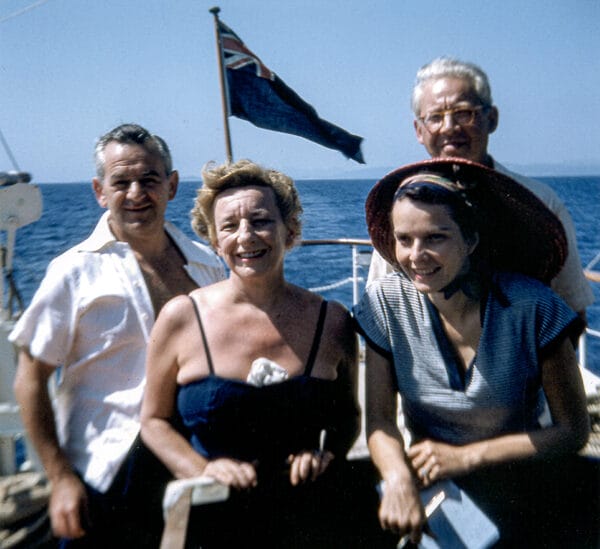 Lillian Hellman with William Wyler and Margaret Tallichet
Perhaps emboldened by the success of the play on its opening night, Hellman confronted her maternal aunt, Florence Newhouse, another Demopolis native, during intermission and pointedly asked her whether she recognized her relatives. The obvious references to family histories and Demopolis locales, including the family’s bank, within The Little Foxes were not favorably received by Hellman’s relatives. Members of the Marx family lived in Demopolis into the 1970s. In one famous story, known to Hellman, her aunt Rosalie Marx slammed the front door on one of her friends who visited the town and revealed himself as Hellman’s friend. Today, however, Demopolis celebrates Hellman and its connections to her masterpiece, last revived on Broadway in 1981 with Elizabeth Taylor as Regina. Revivals of that play and Another Part of the Forest are frequently staged by international theatre companies. A Tony winner for her role as the young Regina in Another Part of the Forest, the late actress Patricia Neal visited Demopolis in November 2007 to deliver a reading of Truman Capote‘s “A Christmas Memory” and visited Demopolis to view the town that had such an influence on Hellman’s work.
Lillian Hellman with William Wyler and Margaret Tallichet
Perhaps emboldened by the success of the play on its opening night, Hellman confronted her maternal aunt, Florence Newhouse, another Demopolis native, during intermission and pointedly asked her whether she recognized her relatives. The obvious references to family histories and Demopolis locales, including the family’s bank, within The Little Foxes were not favorably received by Hellman’s relatives. Members of the Marx family lived in Demopolis into the 1970s. In one famous story, known to Hellman, her aunt Rosalie Marx slammed the front door on one of her friends who visited the town and revealed himself as Hellman’s friend. Today, however, Demopolis celebrates Hellman and its connections to her masterpiece, last revived on Broadway in 1981 with Elizabeth Taylor as Regina. Revivals of that play and Another Part of the Forest are frequently staged by international theatre companies. A Tony winner for her role as the young Regina in Another Part of the Forest, the late actress Patricia Neal visited Demopolis in November 2007 to deliver a reading of Truman Capote‘s “A Christmas Memory” and visited Demopolis to view the town that had such an influence on Hellman’s work.
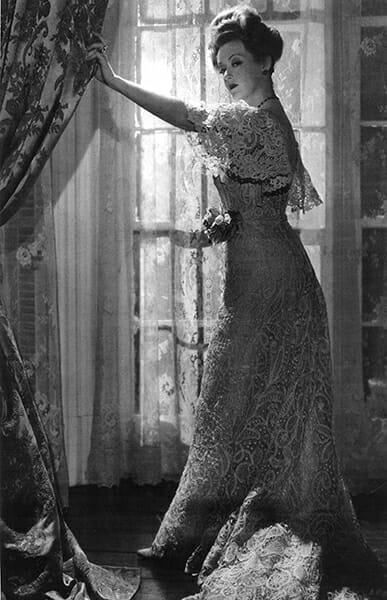 Bette Davis in The Little Foxes
With the support of the Alabama Humanities Foundation, the Marengo County Historical Society and arts organizations in Demopolis and Birmingham staged the Hellman Wyler Festival in early March 2007. The festival examined the Alabama roots of Lillian Hellman and The Little Foxes through performances of Hellman’s plays and screenings of Wyler’s film versions of The Little Foxes and The Children’s Hour accompanied by commentary by scholars of Hellman and Wyler. It also celebrated the state’s links to the family of Hellman’s frequent Hollywood collaborator William Wyler: The film director’s wife, Margaret Tallichet, was the direct descendant of Albert Tallichet (1820-1853), an immigrant to Demopolis from Switzerland. Like Lillian Hellman’s great grandfather Isaac Marx and her grandfather Leonard Newhouse, Albert Tallichet was a successful businessman in nineteenth-century Demopolis. Thanks to the creative collaboration and friendship of Lillian Hellman and William Wyler, the pathways of the Marxes and Tallichets of early Alabama collided again when Hollywood translated The Little Foxes from the stage to the screen. All four children of Margaret Tallichet and William Wyler, in addition to representatives of Lillian Hellman’s estate, attended the 2007 Hellman Wyler Festival to honor this unique chapter in both Alabama and American history.
Bette Davis in The Little Foxes
With the support of the Alabama Humanities Foundation, the Marengo County Historical Society and arts organizations in Demopolis and Birmingham staged the Hellman Wyler Festival in early March 2007. The festival examined the Alabama roots of Lillian Hellman and The Little Foxes through performances of Hellman’s plays and screenings of Wyler’s film versions of The Little Foxes and The Children’s Hour accompanied by commentary by scholars of Hellman and Wyler. It also celebrated the state’s links to the family of Hellman’s frequent Hollywood collaborator William Wyler: The film director’s wife, Margaret Tallichet, was the direct descendant of Albert Tallichet (1820-1853), an immigrant to Demopolis from Switzerland. Like Lillian Hellman’s great grandfather Isaac Marx and her grandfather Leonard Newhouse, Albert Tallichet was a successful businessman in nineteenth-century Demopolis. Thanks to the creative collaboration and friendship of Lillian Hellman and William Wyler, the pathways of the Marxes and Tallichets of early Alabama collided again when Hollywood translated The Little Foxes from the stage to the screen. All four children of Margaret Tallichet and William Wyler, in addition to representatives of Lillian Hellman’s estate, attended the 2007 Hellman Wyler Festival to honor this unique chapter in both Alabama and American history.
The former Marx Bank, built in 1890, still stands in downtown Demopolis at 100 East Washington Street. A livery stable constructed by two of Isaac Marx’s sons now houses a law firm at 108 North Walnut Avenue. A historic marker has been installed at the site of a former Presbyterian Church at Walnut and Capitol Street that was operated as the Demopolis Opera House during the Reconstruction era by Hellman’s grandfather Leonard Newhouse and other merchants. The plantation homes Lyon Hall on Main Street and Bluff Hall on North Commissioners Avenue served as Hellman’s models for Lionnet in Foxes and Forest. These antebellum homes of the aristocratic Lyon Family are now operated as museums by the Marengo County Historical Society.
Additional Resources
Hellman, Lillian. An Unfinished Woman. Boston: Little, Brown, 1969.
Lobenthan, Joel. Tallulah! The Life and Times of a Leading Lady. New York: HarperCollins, 2004.
Martinson, Deborah. Lillian Hellman: A Life with Foxes and Scoundrels. Berkeley, Calif.: Counterpoint, 2005.
Mellen, Joan. Hellman and Hammett: The Legendary Passion of Lillian Hellman and Dashiell Hammett. New York: HarperCollins, 1996.
Rollyson, Carl. Lillian Hellman: Her Legend and Legacy. New York: St. Martin’s Press, 1988.
